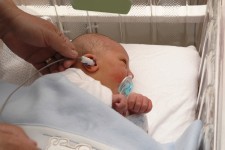Your baby’s hearing
Hearing is very important for language, literacy and brain development. Some babies are born with hearing problems. Hearing loss is the most common congenital condition (meaning it is present at birth) in Canada. It is more common than all other conditions for which babies are screened.
About 3 in 1000 babies are born severely deaf. And another 3 in 1000 have serious hearing loss. Most children who are deaf or have hearing loss are otherwise healthy and born to hearing parents. Some babies have normal hearing at birth, but develop hearing issues later on.
How are hearing problems diagnosed?
There are a few ways to detect hearing loss very early in life. The oto-acoustic emission (OAE) test is the most common one (and the first one used for newborn hearing screening programs). A specialist will put a small microphone in your baby’s ear, which sends a sound. The echo that comes back is sent to a portable computer. The computer can tell whether the baby heard the sound. The test, which takes 10 to 15 minutes, can often be done before your newborn baby leaves the hospital or at a designated hearing screening unit after leaving the hospital.
The Canadian Paediatric Society recommends that all newborns have their hearing tested. Many Canadian provinces and territories have universal newborn hearing screening programs—meaning all babies are tested at birth. Families of babies who screen positive should follow up with a full hearing evaluation.
What are some signs that a child has a hearing problem?
Without newborn hearing screening and special tests, the signs of hearing loss can be very hard to find. Sometimes babies and children seem very alert, so you think they can hear you well, but they are actually using their other senses to know what is going on around them. Or, as they get older, they learn to read your lips on their own.
If you are concerned about or suspect a hearing problem, or if you notice any of the signs listed below, see your doctor as soon possible and ask about a hearing test.
Infants and toddlers
See your doctor if your child:
- was not screened as a newborn and ask for a hearing test.
- stops babbling (usually parents don’t notice this until after 12 months of age).
- does not pay attention or react to loud noises around the house (such as a doorbell, telephone, dog barking).
- does not turn toward sound by 3-4 months of age or turn toward spoken words by 9 months of age.
- has had frequent ear infections and/or fluid draining from the ears.
- does not say single words by 12 months of age.
- does not understand simple phrases unless the person talking is facing them (such as, “Go get your shoes.”).
- starts speaking later than usual. Read our guide on child development from birth to age 4.
- speaks loudly.
Pre-schoolers and school-aged children
See your doctor if your child:
- starts speaking later than usual, or is difficult to understand.
- needs things to be repeated.
- speaks loudly or turns up the volume on electronics so much that it disturbs others.
- has difficulty following simple instructions such as “Go brush your teeth and then wash your face.”
- seems like they are not paying attention, especially when in a group or noisy setting, like child care or school.
- has trouble learning in school (vision should also be checked).
- is easily frustrated, more so than other children of the same age.
Remember, the signs of hearing loss can be difficult to detect and may get worse after birth. You may only notice them when the hearing loss has been present for many months, or even years. Young children are very good at making up for any difficulties they are having, even if they hear very little.
Do children with hearing problems develop the same as other children?
It depends on how early the problem is diagnosed. Children who are diagnosed later—especially after 2 years of age—may have lifelong problems with language, speech and literacy. If the hearing loss begins at a later age, especially after the child has started to talk, your child’s language development may be less affected.
Success in school is linked to literacy—being able to read and write effectively. And literacy is linked to the hearing and speech areas in the brain. To be able to speak, children need to hear. Children who hear and speak learn to read and write more easily.
The first few months of life are critical for developing the speech and language area of the brain. Studies show that the earlier a baby can hear, the better their language skills will be. Deaf children who are diagnosed early and get the right kind of help can develop just like other children their age.
What do I do if I think my baby isn’t hearing well?
If you have any concerns about your baby’s hearing, speech and language, or developmental progress, talk to your doctor. Though your doctor won’t be able to diagnose hearing loss in the office, you can be referred to a centre that can test your child’s hearing and tell whether there is a problem.
The earlier a hearing problem is found and treated, the easier it will be for your child to get the help they need to communicate and learn.
What help is available if my baby has a confirmed hearing loss?
Technologies such as digital hearing aids and cochlear implants, allow even severely deaf children to hear and speak. Even newborns can be fitted with hearing aids. Cochlear implants are being placed in younger and younger infants, with the ideal time being before 1 year of age.
Reviewed by the following CPS committees
- Community Paediatrics Committee
Last updated: May 2020

